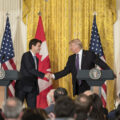If the first salvo fired by U.S. President Donald Trump in the form of a threatened 25-per-cent across-the-board tariff on Canadian goods (excluding energy, which would face a 10-per-cent levy) is a preview of future trade disputes, retaliatory tariffs alone will not solve the problem. Canada will need to turn to eliminating interprovincial trade barriers, rely on European and Asian trade deals to engage in new markets, and prepare for the prospect that long-standing Canadian regulations and market restrictions may face increasing pressure for an overhaul.
My Globe and Mail op-ed argues the need for change is particularly true for Canadian digital and cultural policy. Parliamentary prorogation ended efforts at privacy, cybersecurity and AI reforms and U.S. pressure has thrown the future of a series of mandated payments – digital service taxes, streaming payments and news media contributions – into doubt. But the Trump tariff escalation, which now extends to steel and aluminum as well as the prospect of reviving the original tariff plan in a matter of weeks, signals something far bigger that may ultimately render current Canadian digital and cultural policy unrecognizable.
Our cultural frameworks are largely based on decades-old policies premised on marketplace protections and mandated support payments. This included foreign ownership restrictions in the cultural sector and requirements that broadcasters contribute a portion of their revenues to support Canadian content production.
As we moved from an analog to digital world, the government simply extended those policies to the digital realm. But with Mr. Trump appearing to call out what he views to be Canadian protectionist policies in sensitive sectors such as banking ownership, the cultural and digital sectors may be next.
If so, there are no shortage of long-standing policies that tilt the playing field in favour of Canadians that could spark some uncomfortable conversations.
Why do U.S. companies face ownership restrictions in the telecom and broadcast sectors? Why are Canadian broadcasters permitted to block U.S. television signals in order to capture increased advertising revenue? Why do Canadian content rules exclude U.S. companies from owning productions featuring predominantly Canadian talent?
The Canadian response that this is how it has always been is unlikely to persuade Mr. Trump.
Canadian policies premised on “making web giants pay” may also be non-starters under Mr. Trump. For the past five years, the Canadian government seemingly welcomed the opportunity to sabre rattle with U.S. internet companies. This led to mandated payments for streaming services to support Canadian film, television and music production; link taxes that targeted Meta and Google to help Canadian news outlets; and the multibillion-dollar retroactive digital services tax that is primarily aimed at U.S. tech giants.
Not only have those policies raised consumer affordability and marketplace competition concerns, they have also emerged as increasingly contentious trade issues. If the trade battles with the U.S. continue, the pressure to scale back the policies will mount.
Beyond rethinking established cultural and digital policies both new and old, the bigger changes may come from re-evaluating the competitive impact of policies that rely heavily on regulation just as the U.S. prioritizes economic growth through deregulation. Proposed Canadian privacy, online harms and AI rules have all relied heavily on increased regulation, looking to Europe as the model.
For example, consider the Canadian approach to AI regulation in the now-defunct Artificial Intelligence and Data Act. It specifically referenced the European Union’s regulatory system, which establishes extensive regulatory requirements for high-risk AI systems and bans some AI systems altogether.
However, the European approach is not the only game in town. Mr. Trump moved swiftly to cancel the former Biden administration’s executive order on AI regulation, signalling that the U.S. will prioritize deregulation in pursuit of global AI leadership. Further, the arrival of DeepSeek, the Chinese answer to ChatGPT, took the world by storm and served notice that U.S. AI dominance is by no means guaranteed.
The competing approaches – U.S.-style lightweight regulation that favours economic growth against a more robust European regulatory model that emphasizes AI guardrails and public protections – will force difficult policy choices that Canada has thus far avoided.
Indeed, we never really tried to reconcile two competing objectives: driving economic growth through AI investment and establishing regulatory guardrails to protect against potential AI bias and harms. That led to billions in new government spending to support new data centres in the hope of fostering a globally competitive industry and the introduction of European-style regulations that risk making Canada a less attractive destination for AI investment.
The Canadian government may yet opt for the regulatory model, convinced that AI safeguards are more important than economic success (or bet that the two do not necessarily conflict). However, the threat of Trump tariffs reframes the U.S.-Canada relationship as competitors more than partners, forcing us to re-examine our plans for future regulation and potentially uproot our entrenched cultural and digital policy frameworks.











Instead of celebrating the Trump administration’s approach to international trade and its attitude toward Canada, which coincides with his deregulatory and libertarian agenda, Michael Geist should be looking for ways to reinforce our national identity and cultural sovereignty.
Does Geist not pass your ideological purity test? Ever consider that some people are just dispensing information as opposed to picking a team?
I have considered that, but Michael Geist is not just dispensing information. He’s been playing for the same team for many years…
“This included foreign ownership restrictions in the cultural sector”. Too bad this didn’t extend to sectors important to national security. Some of the largest defense contractors in Canada are wholly owned subsidiaries of the American defense industry (General Dynamics Mission Systems Canada, General Dynamics Land Systems Canada, Lockheed Martin Canada. I don’t include places like St John’s Shipbuilding and Davie Shipbuilding since they are primarily build civilian pattern hulls even though they do have some military contracts).
Fortinbras, not sure how you read into the essay that Prof Geist is celebrating the Trump approach; to me his is simply pointing out the differences between the American and European approaches, and what the Canadian government has done, so that people can form their own opinions (something which is sorely lacking in the coverage in the Canadian media). Your posting implies that no one should care what the differences are, just accept that one approach is right and that must not be questioned.
It is clear in Michael Geist’s post that he favours “economic success” which he equates with economic growth, irrespective of the distributive aspects of this growth. Michael Geist believes that deregulation, as practiced by the Trump administration, will lead to greater economic growth. This is an old twentieth century approach, still favoured by many libertarians and conservatives, which asserts that if total economic output grows, the benefits will somehow trickle down to everybody. We know this not to be true, as the American economic historian, Robert Gordon, among others, has demonstrated. The question remains: conomic growth for whom, and at what price for our national sovereignty and cultural identity?
That’s not at all what he said, though. Did you even read his article or are you just making stuff up? Feel free to quote him to show why you think he said anything like that.
Indeed.
“Our cultural frameworks are largely based on decades-old policies premised on marketplace protections and mandated support payments. This included foreign ownership restrictions in the cultural sector…” and “Why do U.S. companies face ownership restrictions in the telecom and broadcast sectors? Why are Canadian broadcasters permitted to block U.S. television signals in order to capture increased advertising revenue? Why do Canadian content rules exclude U.S. companies from owning productions featuring predominantly Canadian talent?” and “Beyond rethinking established cultural and digital policies both new and old, the bigger changes may come from re-evaluating the competitive impact of policies that rely heavily on regulation just as the U.S. prioritizes economic growth through deregulation.” And “The competing approaches – U.S.-style lightweight regulation that favours economic growth against a more robust European regulatory model that emphasizes AI guardrails and public protections – will force difficult policy choices that Canada has thus far avoided.” These are just some of the assertions and rhetorical questions that promote Michael Geist’s economic growth at any cost perspective. You obviously haven’t read the article attentively…
I recommend everyone to find the book titled The Hidden Path to Manifesting Financial Power, It changed my life.
Michael Geist has a unique opportunity to champion our national identity and cultural sovereignty, and it’s time to explore innovative ways to strengthen these vital aspects of our society.
The article highlights how Trump’s trade threats may compel Canada to rethink its digital and cultural policies, as long-standing regulations face pressure amid potential U.S. tariffs, shifting the focus from protectionism to competitiveness in the global market. papa’s games
If Canada were to shift toward a more U.S.-aligned, deregulated approach to AI and digital policy, what potential risks could arise for consumer privacy, Retro Bowl College data security, and cultural sovereignty?
That’s an interesting take on Canada’s regulatory approach to AI. It seems like there’s always a balancing act between fostering innovation and ensuring proper safeguards. If the government leans more toward strict regulations, it could slow down AI-driven economic growth, but at the same time, it might prevent some of the ethical and security risks we’ve seen in other markets. The potential impact of U.S. tariffs adds another layer of complexity—Canada might need to rethink how it positions itself in the global AI race. Do you think there’s a way to achieve both strong AI regulation and economic competitiveness without falling behind?
ddd
I can’t believe how realistic the physics are! Every turn and Drift Hunters feels so lifelike. Best racing game I’ve played in ages.
Web app security testing in the UAE is vital for businesses to protect their applications from cyber threats. As digital adoption grows, vulnerabilities in web platforms can expose sensitive data to attacks. ae.penetolabs specializes in identifying security Web App Security Testing in UAE gaps through advanced penetration testing, ensuring robust protection against potential breaches. Their expert approach helps companies stay compliant with cybersecurity regulations while strengthening overall security. Prioritizing proactive web app security testing is essential for maintaining trust, safeguarding user data, and ensuring business continuity.
What are the possible implications for consumer privacy, Stickman Hook data security, and cultural sovereignty if Canada adopts a more US-aligned, deregulated approach to AI and digital policy? Stickman Hook
The potential impact of U.S. tariffs adds another layer of complexity—Canada might need to rethink how it positions itself in the global AI race.
Having had two months to reflect and to absorb new happenings since this podcast episode, I wonder if your position has changed. Something that stuck with me was when you suggested that Canada look for ways to give Trump “some wins”. Even at the time that didn’t sit right, and today sounds absolutely preposterous. Trump and his people are taking the United States down the road of extreme authoritarian fascism. We should absolutely not be trying to give “wins” to someone who isn’t playing fair.
The image of the leaders of China, Japan, and Korea shaking hands demonstrates exactly what we should be doing. Stand strong with our remaining allies. Give Trump nothing. We can’t knuckle under to unreasonable demands because the next unreasonable demand isn’t far away. And the next, and the next.
More troubling than the current American president’s threats to annex Canada is the silence from other Americans—especially the CEO class and political elites. They were never our allies and never had our interests at heart. Dr. Geist’s long-standing advocacy for deeper integration with American media and technology were framed as pragmatic and forward-thinking. But as we are now learning—perhaps too late—that this path has made Canada dangerously vulnerable.
Canada must urgently re-evaluate its strategic autonomy and invest in domestic capacity—and not just in media and tech.
Interesting perspective on the US-Canada trade situation. It seems like retaliatory tariffs are just the appetizer. Canada might need to get creative. Think about it – simplifying internal trade is like mastering Papa’s Pizzeria , efficiently managing ingredients for a better overall product. New markets offer a fresh customer base, and regulatory reform might be the special sauce needed for long-term success. A complex recipe, indeed!